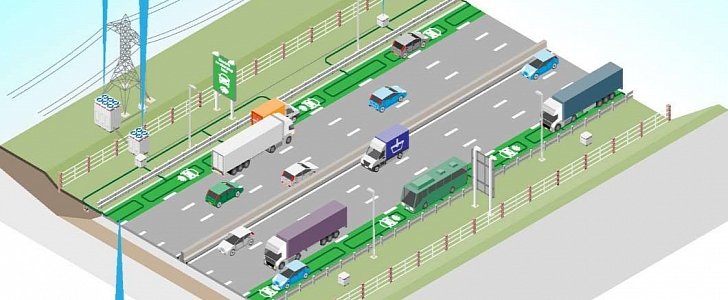You may have heard of the newest gizmo on the block; we’re talking about wireless charging, of course. Galaxy Note 5 and Galaxy S6 Edge have the technology, apparently, and it’s working quite fast. Two hours, and you’re good to go. Not bad, right? Well, what if our car’s battery could charge in a similar way, only that it would do so while on the road?
Imagine this. You’re hitting the Insane Mode with your Tesla Model S P85D when things get quite dull. You’re running short on battery; there’s not much of that e-juice left in the “tank”. Sure, there’s a supercharger about 50 miles away from where you stand right now, but you’d rather push the pedal to the metal, instead of driving in a sustainable way. Keep in mind we’re still talking about electricity here.
What if, instead of waiting for a charging station you’d simply charge on the road while driving? A British company named Highways England is working on a new technology that would allow that to happen. Off-road trials of the technology needed to power electric and hybrid vehicles on the country’s major roads are due to take place later this year.
“The potential to recharge low emission vehicles on the move offers exciting possibilities. The government is already committing £500 million ($780,250,000) over the next five years to keep Britain at the forefront of this technology, which will help boost jobs and growth in the sector. As this study shows, we continue to explore options on how to improve journeys and make low-emission vehicles accessible to families and businesses.”
The trials will start later this year following the completion of an ongoing procurement process, and will last for approximately 18 months. If the results are promising, you should expect road trials next.
What if, instead of waiting for a charging station you’d simply charge on the road while driving? A British company named Highways England is working on a new technology that would allow that to happen. Off-road trials of the technology needed to power electric and hybrid vehicles on the country’s major roads are due to take place later this year.
A world premiere
According to the government, we’re looking at a world premiere. They will test how the technology would work safely and efficiently on the country’s motorways and major A roads. The purpose clearly is to allow drivers to travel long distances without needing to stop and charge the car’s battery. Here’s what Transport Minister Andrew Jones thinks about this project:“The potential to recharge low emission vehicles on the move offers exciting possibilities. The government is already committing £500 million ($780,250,000) over the next five years to keep Britain at the forefront of this technology, which will help boost jobs and growth in the sector. As this study shows, we continue to explore options on how to improve journeys and make low-emission vehicles accessible to families and businesses.”
The trials will start later this year following the completion of an ongoing procurement process, and will last for approximately 18 months. If the results are promising, you should expect road trials next.
